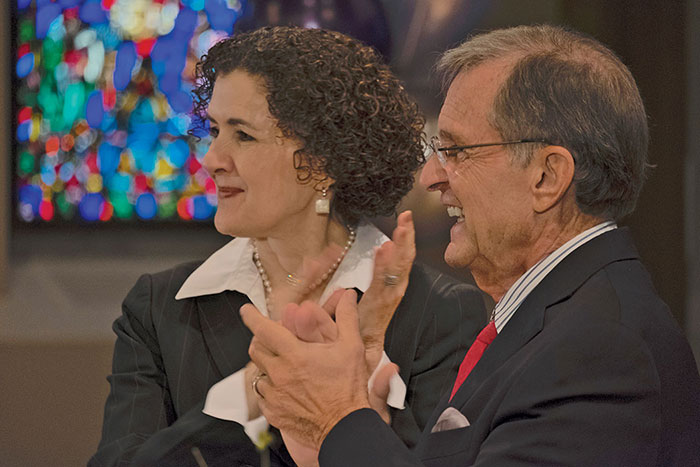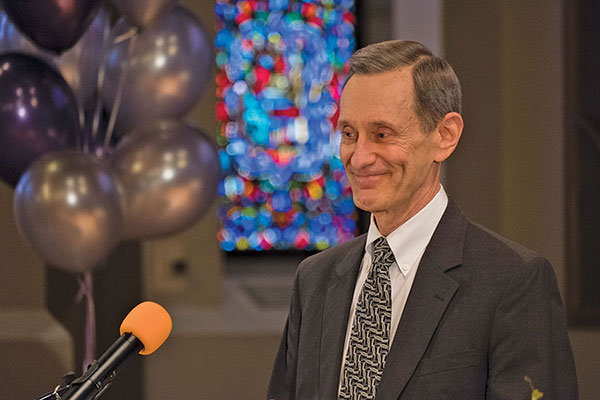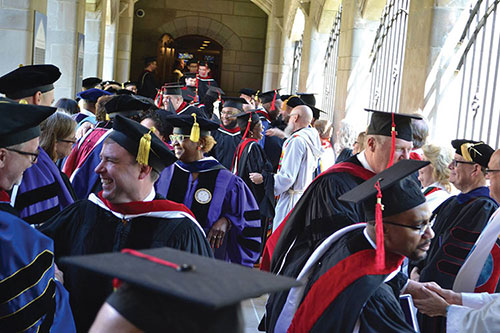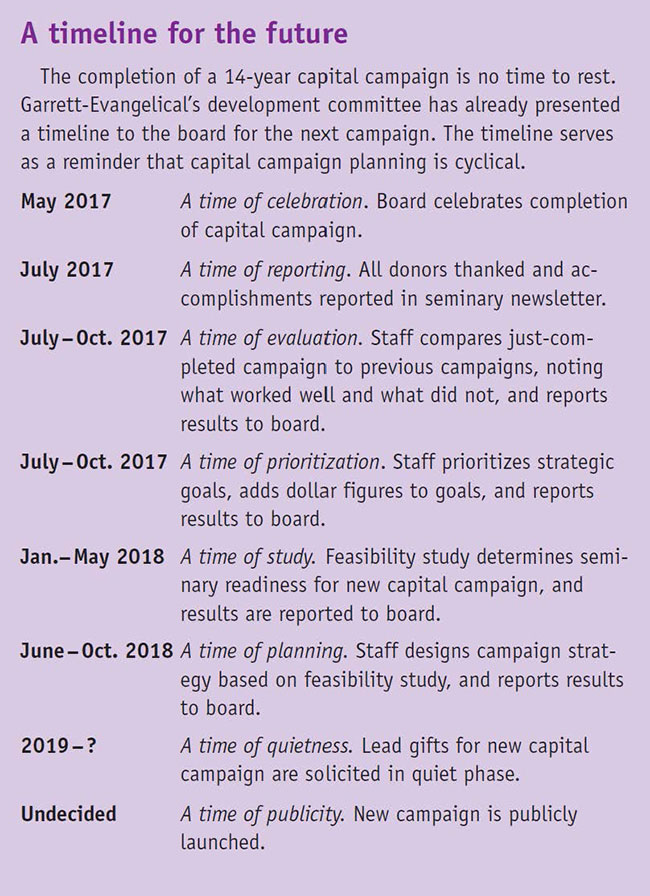 |
| Credit: Christian Surtz, SurtzMedia |
When Garrett-Evangelical Theological Seminary decided to celebrate its 150th anniversary with a capital campaign in 2003, the United Methodist school had no idea the campaign would eventually last 14 years, span four presidencies, and ultimately bring in more than $100 million.
The original goal was just $35 million. That was three times larger than any previous capital campaign at the seminary, but Vice President for Development David Heetland thought it was realistic at the time.
The goal was met in 2006, just three years later. So the trustees upped the ante and reset the goal to $60 million. They met that benchmark in 2009 despite the recession. So the board decided to raise the bar again and set a new goal of $100 million. Under the leadership of President Lallene J. Rector, whose term as president began in January 2014, Garrett-Evangelical finally completed its long campaign this year, with a final total of $102 million.
In Trust asked Rector and Heetland about their successful capital campaign, and about their philosophy of stewardship:
Q Why was your capital campaign so long? How much did you raise?
David Heetland, vice president for development: We had no intention of it being a long campaign. In fact, we said when we started that it was going to be a $35 million sprint, and instead it turned into a $100 million marathon. But after it was all over, we had raised $53.3 million for unrestricted endowment, $38.2 million for endowed scholarships, $8.1 million for endowed faculty chairs, and $2.3 million for endowed program support. Sixteen percent of the funds raised came from alumni, 25 percent from trustees, 54 percent from friends, 3 percent from foundations, and 2 percent from churches.
We built the case by reviewing our rich history, mission, student body, faculty, curriculum, and funding sources. We highlighted our four major campaign goals. Our case statement had a lot of pictures, graphs, and testimonials, and concluded with a chart showing the gifts required to reach the goal. It also included an invitation to “join us in forging our future,” which was the campaign’s theme. We used the case statement for individual visits and in nearly 200 small informational gatherings held across the country.
|

|
|
Earlier this year, President Lallene Rector and board chair Jerre Stead cheered when it was announced that Garrett-Evangelical Theological Seminary's capital campaign had surpassed their $100 million goal.
Credit: Bill Burlingham
|
Q How do you get ready for a capital campaign?
Lallene Rector, president: It’s important to have a vision and a strategic plan that shows the board what our goals are, what we’re doing, and what resources we need to make it happen. In today’s shifting landscape, the president helps interpret how the school can be responsive to outside changes. Developing that vision is part of getting ready for a capital campaign.
Heetland: I agree that the first step to get ready for a capital campaign is to make sure that you’ve developed a compelling strategic plan, that you’ve prioritized the strategic goals, and that you’ve attached dollar figures to whichever goals cost money. The second step is to conduct a feasibility study to determine both the internal and the external readiness to launch a campaign, and to report the results of the study to the trustees for their action. The third step is to design a campaign strategy, including dollar goals and timeline. The fourth step is to have a period of quietness, seeking lead gifts that can ensure the campaign’s success. The fifth step is to launch the campaign publicly, which we did when half of our goal was in place and we were ready to shout it from the mountaintop.
The board can help prepare for the campaign by endorsing the strategic plan, by making sure that the necessary resources (including dollars and personnel) are available to conduct a successful campaign, and by setting the pace and leading the way. They should be among the first to make a financial commitment, and their combined commitments should equal at least 15 to 20 percent of the goal — and hopefully more. They should also be willing to introduce others to the campaign by hosting small informational gatherings.
Q Do you have a theology of fundraising or stewardship?
Heetland: I grew up on a farm, and one of my favorite parables is the parable of the sower, in which some seeds fell on rocky ground, some seeds on thorny ground, and some seeds on good soil. The sower does not cause the seeds to grow. The sower simply plants the seeds, knowing that God will cause some to bring forth grain.
So it is with fundraising. We are called to diligently plant seeds day in and day out. We never know for sure which seeds will sprout and produce gifts. We simply know that if we are faithful in our work, the Word is our promise and we can rest in the knowledge that God will cause some to grow and bring forth grain. These are our “happy surprises” — and they remind us that God is always at work in our midst.
Rector: I am grounded in the two great commandments: to love God and to love neighbor. When someone makes a monetary gift to the seminary, it’s a way to participate in educating and equipping leaders for the church, the academy, and the world — people who will help other people learn to love God and their neighbors.
What I’ve learned is the importance of building relationships and telling the story of the institution. So it’s not just getting donors to write a check — it’s developing a relationship and having conversations about their interests and commitments. We’re trying to help others consider that giving to the seminary can be a way of participating in God’s larger purpose.
 |
At the May 2017 trustee meeting, David Heetland, vice president for development, made the happy announcement that the seminary had surpassed its campaign goal.
Credit: Bill Burlingham |
Q Is it hard to ask for money?
Rector: I used to think it would be the hardest thing to do. But I have realized that if you love the school and see the impact the graduates have, that makes it easy to ask for gifts. I just couldn’t imagine working for a school or an institution about which I felt lukewarm. That would make it very difficult.
Heetland: I don’t think anyone grows up wanting to be a fundraiser. However, I view solicitation as an invitation to become involved in something greater than ourselves, which, as Jesus tells us, is when we find true happiness and fulfillment. It is up to us to extend the invitation, and it is up to others to respond to that invitation as they are so led. The worst thing that can happen is that someone can say “no” — and that’s not the end of the world. The key is to learn not to take “no” as a personal rejection.

Q Did you have any disappointments in the capital campaign? How did you deal with those?
Heetland: As in any campaign, there were unhappy surprises, but those were more than offset by the many happy surprises that happened repeatedly throughout the campaign and gave us the strength to continue telling the story.
Sometimes unhappy surprises turn into happy surprises. I had a disgruntled donor who told me he was taking the seminary out of his will because he had read something that made him think he wasn’t in line with the seminary’s goals anymore. So I invited him to lunch with the president to share his concerns with her directly. He felt he had been heard at that lunch — so much so that he not only put the seminary back in his will, but also increased his planned gift.
Rector: We try very hard to listen and learn. Sometimes you can’t win people back and you have to let it go, especially when the seminary has theological and social justice commitments that some alumni cannot support.
Q What would you tell a new president about fundraising?
Heetland: Remember the three “P’s” of successful fundraising: passion, perseverance, and patience. If you are passionate about the mission of your school, it will be contagious. However, gifts, especially large ones, don’t often happen on the first (or even second or third) visit, so you must persevere and continue to nurture those relationships. Finally, you must practice patience (or as I sometimes say, “patient urgency”), as gifts are made on the donor’s schedule, not yours.
Get to know and appreciate your donors in their fullness, so you can be a more responsible caretaker of their gifts. It is only when we understand their hopes and values that we can bring together the dreams of individuals and the goals of our institutions.
Rector: My advice would be to become a friend of your development officer. Teamwork is the best way to go. It’s important to respect the expertise they bring. But for the development officer to have something to work with, the president needs to provide a vision.
Q What is the president’s role in fundraising?
Heetland: The president has to set the vision and articulate that vision to as many people as possible. The president may or may not be involved in the actual solicitations, but it is essential that people understand how successfully completing the campaign will help ensure that the vision becomes reality.
Rector: Also, internal and external communication is key. I work closely with our director of communication and marketing to get our stories out there. I say we should all have, on the tips of our tongues, three to five stories about recent graduates or current students and the ministry they’re engaged in.
It’s also really important to communicate to the board and to tell them how important their contribution is to making our work possible. I try to regularly express my gratitude to the board. It really helps them feel connected and invested in us.
 |
The class of 2017 leaves the Garrett-Evangelical Seminary chapel with congratulations and hugs from faculty and trustees.
Garrett-Evangelical Theological Seminary |
Q How will you keep the energy going?
Heetland: Keeping our energy up does not seem to be one of our problems! The development committee has drawn up a set of next steps in prioritizing goals from our current strategic plan. So, even as we’re wrapping up this campaign, we’re laying the foundation for the next campaign.
Rector: Leaders of theological schools can’t coast. I do have a lot of energy for this work. It’s a joy and a privilege, because we love and believe in the school.
Heetland: If you have the passion for an institution, then it’s not work, it’s fun.
